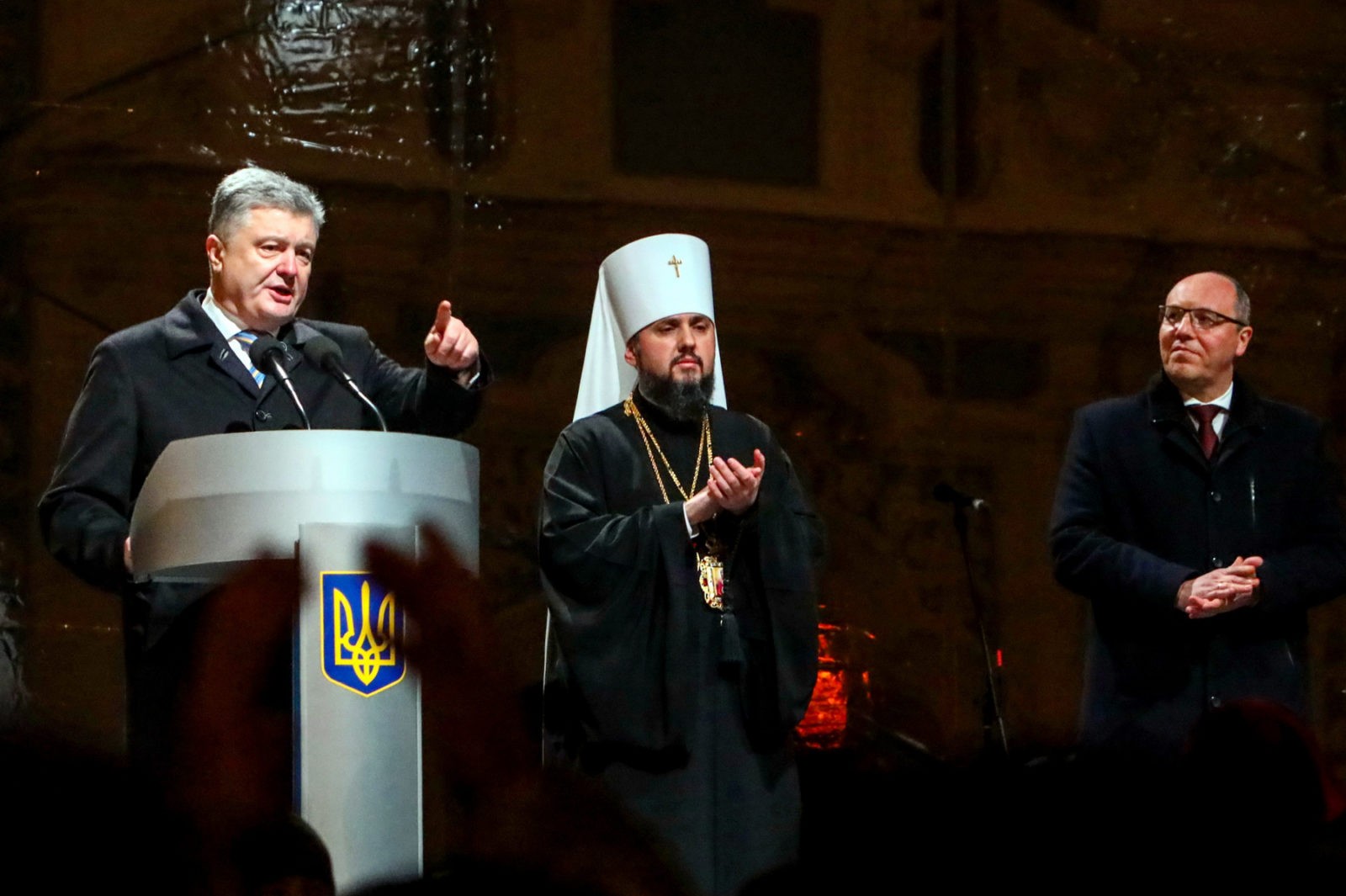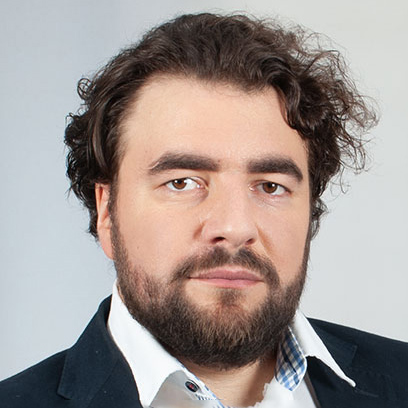On 15 December, many of Ukraine’s top religious leaders convened for a seismic event — the Church Unification Council. Announced at the meeting? The establishment of a new and independent Orthodox Church of Ukraine (OCU). Its leader is to be Serhii Petrovych Dumenko, a youthful 39-year-old, who will serve as Epiphanius I, Metropolitan of Kyiv.
Even so, the Church of Constantinople most likely will not award the OCU a Patriarchate. In this regard and others, the independent stature of this fledgling church will not be complete. But at this stage, the Ukrainian authorities are less concerned with a clean or coherent theological alignment than they are with a resounding political demarcation from Russia.
Politics first
The OCU’s founding is of course a political event. Contrary to the statements of some representatives of the Russian Orthodox Church, there are no serious contradictions in matters of dogma in the case of this intra-Orthodox conflict. Disputes about hierarchy, no matter how serious they are, are no reason for accusations of heresy.
Several facts from the short history of the new church emphasise its political slant. No priest first asked Patriarch Bartholomew of Constantinople to give Ukraine tomos (the decree on autocephaly.) That was Ukrainian President Petro Poroshenko. As a guest, he was present at key religious meetings. He announced the creation of the OCU in person, as well as revealing the appointment of Epiphanius I.
The president now plans to travel with the head of the new church to Istanbul in early January. Here he will receive a church decree on the new church (tomos) from the hands of the patriarch of Constantinople. Most likely this will regulate the OCU’s status and possibilities for automony. At the same time, the tomos will not give the OCU full independence. It is already clear that the restoration of the patriarchate will not happen. It means the only patriarch for Orthodox Ukrainians will be the head of the Church of Constantinople, Bartholomew.
Back in 2013 such a scenario seemed inoperable to the new Metropolitan of Kiev and All Ukraine, Epiphanius. It allows two different Ukrainian Orthodox churches to exist in the country. Namely, the Constantinople Patriachate and the Moscow Patriarchate. But now, this obstacle is less of a sticking point, hinting at changed political circumstances.
Consent for participation in the Constituent Council of the Ukrainian Orthodox Church of Kiev Patriarchate (UOC-KP, second largest Orthodox church in Ukraine) was important for the Ukrainian authorities and Constantinople. They agreed to close their eyes to the desire of the head of the UOC-KP Filaret to remain patriarch way one or another.
As a result, despite the self-dissolution of the UOC-KP, its former head retained the strange title of “honorary patriarch”. This is analogous to the “honorary presidents” of various unions, societies and universities. Yet, in the Orthodox tradition this title has no analogues. It sounds not quite heretical, but just comical. This title could not have appeared within Orthodoxy without political interference.
A union of minorities
The Council held in Kyiv did not become unifying for all Orthodox churches of Ukraine. Only two bishops from the largest Ukrainian Orthodox church — the Moscow Patriarchate (UOC MP) — participated. These were Metropolitan Sinion of Vinnitsa and former secretary of the late Kiev Metropolitan Vladimir, Metropolitan Pereyaslav-Khmelnitsky and Vishnevsky, Alexander.
On the same day, the UOC-MP banned both from the canonical, in its version, diptych of the bishops of Ukraine, declaring that they had “gone to schism”. No one else from the hierarchy of the “Moscow” Ukrainian Orthodox Church had turned up. In connection with this, the Russian Orthodox Church announced the failure of Petro Poroshenko’s plans to create a new autocephalous church without the consent of the Moscow Patriarchate.
The union of the former UAOC (Ukrainian Autocephalous Orthodox Church) and the UOC-KP will be joined by only a small part of the parishes of the UOC-MP. The parishes of all three churches are all over country. But, the UAOC had them concentrated in the West; the UOC-KP is poorly represented in the east and south of Ukraine. At the same time, the question of the patriarchate for Ukraine may well be off limits for many years.
As a result, as the head of the new autocephalous church predicted in 2013, the country would be divided into two camps. Instead of the previous three, there would be two Orthodox churches. The social, unifying essence of religion is forgotten. The rivalry of two churches creates risks for the political clashes. It could aid the emergence of new conflicts and provocations on the part of Russia. Via the Moscow Patriarchate, Russia retains administrative and political control over what is still the largest Ukrainian Orthodox church.
Retaining influence over hearts and souls
Given the important role of the ceremonial side in the Ukrainian and Russian Orthodoxy, the division may soon deepen: the OCU is adopting of the distinct ceremonial traditions of the Church of Constantinople. At the level of ordinary believers – members of the UOC MP – this will lead to new charges of heresy. This will happen in the same way that the two-finger or three-finger sign of the cross became a matter of dogma, rather than a technical problem of the rite. Such was the case with the schism in Russian Orthodoxy in the 17th century during the Nikon reforms that suggested Greek Orthodoxy as a role model.
At the same time, Russia’s intervention in the internal affairs of Ukraine after the creation of a OCU is unlikely to decrease. In fact, it heralds permanent measures to support the UOC-MP. Given the current dire relations of the two countries, these measures could be economic, diplomatic, political and military. It cannot be ruled out that the Russian authorities will maintain and inflate intercommunal religious conflicts to stoke domestic tensions and divides.
This could cause a headache for the Ukrainian authorities. After all, the redistribution of church property between the UOC-MP and the new local church is already becoming a reality. And the inevitable intercommunal Orthodox disputes could even be a good argument for Russia in its negotiations with European politicians. Any land ownership tensions can be highlighted by Russia during any attempt to prove Ukraine is an unstable partner.
A wildcard in the pack is that the Patriarch of Constantinople is dependent on the Turkish authorities. The Turks now have an instrument, on the one hand, to influence Ukraine, and on the other, an argument in trade, economic and political negotiations with Russia. If Moscow agrees with President Recep Erdogan, in the future it will be able to influence the situation in Ukraine by proxy.
Thus, the creation of a new Orthodox Church of Ukraine is a political event, not a religious one. At the same time, at least at this stage, the goal of reducing Russian influence, declared by President Petro Poroshenko, is not being achieved. The Russian influence on Ukrainian public life is preserved. Risks of Russia destabilizing the situation in society may even increase as a result of this split.










